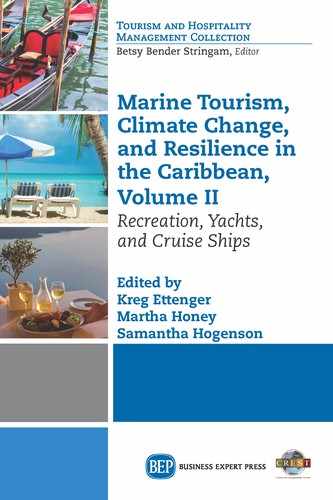Adaptation: The adjustment in natural or human systems in response to actual or expected climatic stimuli or their effects, which moderates harm or exploits beneficial opportunities.1
Caribbean: According to the United Nations, the Caribbean region consists of: Anguilla, Antigua and Barbuda, Aruba, The Bahamas, Barbados, Bonaire, Saint Eustatius and Saba, British Virgin Islands, Cayman Islands, Cuba, Curaçao, Dominica, Dominican Republic, Grenada, Guadeloupe, Haiti, Jamaica, Martinique, Montserrat, Puerto Rico, Saint-Barthélemy, Saint Kitts and Nevis, Saint Lucia, Saint Vincent and the Grenadines, Saint Martin (French) and Sint Maarten (Dutch), Trinidad and Tobago, Turks and Caicos Islands, and United States Virgin Islands.2
Marine Protected Area: The International Union for the Conservation of Nature and Natural Resources (IUCN) defines a protected area as “A clearly defined geographical space, recognised, dedicated and managed, through legal or other effective means, to achieve the long-term conservation of nature with associated ecosystem services and cultural values.” Marine protected areas come under a variety of names and with a wide range of purposes and levels of protection, as described in the IUCN’s 2012 guidelines on the subject.3 The Convention on Biological Diversity, in its COP 7 Decisions in 2004, expanded the term to “Marine and Coastal Protected Areas” (MCPAs) to include adjacent coastal areas, which are often important components of critical marine ecosystems.4
Marine Tourism: Those recreational activities that involve travel away from one’s place of residence and which have as their host or focus the marine environment.5
Mitigation: The lessening or limitation of the adverse impacts of hazards and related disasters.6
Resilience: The ability to prepare and plan for, absorb, recover from, and more successfully adapt to adverse events.7
Responsible Tourism: Tourism that maximizes the benefits to local communities, minimizes negative social or environmental impacts, and helps local people conserve fragile cultures and habitats or species.8
Sustainable Development: Development that meets the needs of the present without compromising the ability of future generations to meet their own needs.9
Sustainable Tourism: Tourism that leads to the management of all resources in such a way that economic, social, and aesthetic needs can be fulfilled while maintaining cultural integrity, essential ecological processes, biological diversity, and life support systems.10
